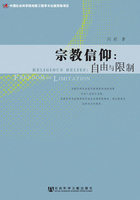
ABSTRACT
The religious study is becoming “the hot spot” in recent years. Many works and articles have been published on the freedom of religious belief,even some scholars have proposed the concept of religion-law science. However,The freedom of religious belief still has the necessity of “deep description” in current China. Theory is mainly set up by its core conceptions. This article selects “the freedom of religious belief” as the core concept,along with the characteristic,the function,effectiveness,the boundary and the cultural background,having carried on the multi-dimensional analysis respectively and progressively to this concept.
Firstly,based on the international human rights documents and the selected 105 national constitutions,this article studies empirically different names about the freedom of religious belief in many countries,as well as chinese scholars’ understanding to the freedom of religious belief. Combined with the characteristics of law science,this article also argues that the connotation of freedom of religious belief should be wholly understood and respectively expressed. Futhermore,it has also analyzed the reason why we use the concept of “the freedom of religious belief” and proposed author’s personal idea on this topic.
Secondly,on the basis of the connotation of this core concept,this article has analyzed the extention of the freedom of religious belief. The freedom of religious belief includes eight items as follows:the freedom of believing,the freedom of expressing personal religious belief,the freedom of religious education,the freedom of religious donation,the rights of religious information,the rights of religious exempt,the freedom of religious group and the freedom of religious minority. Generally speaking,the freedom of religious belief is not only the basic and primary human right,but also the international human rights;not only the individual freedom but also the community freedom;not only the negative right but also the positive right;not only the defensive right but also the extensive right. The freedom of religious belief is not only different from the religion,the belief and the superstition,but also diffrernt from the freedom of thought,the freedom of conscience and the freedom of will.
Thirdly,the freedom of religious belief has its constitutional validity. In the perspective of value,the freedom of religious belief concerns the thought dignity,the spiritual dignity and the personal dignity of human beings. It has manifested the justice of law. The freedom of religious belief has manifested the unification of universal equality and the special equality (the special protection for minority religious belief),the unification of equally enjoying the right of religious belief and the fulfilling the obligation of constitution;Tolerance is the premise of the freedom of religious belief,the freedom of religious belief has manifested the tolerant spirit of human being. In the perspective of function,the freedom of religious belief is helpful to individual and social virtue achievement;The freedom of religious belief has intimate relationship with economic development. It can push forward economic development. The individual of spiritual freedom is the foundation of social cooperation of human being.
Fourth,the freedom of religious belief has its boundary. The validity which limits the freedom of religious belief lies in follows:The freedom of religious belief is relative right and has the possibility of abusing;The intrinsic value of the freedom of religious belief can’t surmount the value of public order;The state power and the social power have its own validity as well. This article uses empirical and comparative analysis,discovering that the freedom of religious belief limitation includes the dominant limitation (legal regime limitation) and the recessive limitation (idea and legal malfunction limitation). The primary principle of the legal regime limitation mainly concentrates on the principle of public peace and order,the public morality,the protection for other people’s rights,the public security and the public health. The different understanding of this core concept between elite and the populace recessively limits the practice of the freedom of religious belief. But the multi-dimensional character of law,the possibility of law experience,the overdoing of legal power as well as the indefinite system cause the problems of imperfect legal regime and the legal malfuction,consequently make public religion policy the important remedial treatment after legal malfunction.
Fifth,through diachronism analysis to the freedom of religious belief,this article makes the point that the freedom of religious belief has experienced the whole course from the obligation to the limited right to the full right in western world. Modern concept of freedom of religious belief,deeply influenced by western culture and history,is the product of bourgeois revolution. Freedom of religious belief,along with human rights movement in Europe,has sproden all over the world and standardized by international society. But the homogenization of freedom of religious belief in constitution has not eliminated different understanding to this concept by various countries. Actually,the freedom of religious belief is not a doctrine,let alone a western doctrine. This provides historical profiting for chinese practice of freedom of religious belief.
Sixth,after diachronism analysis in redutionism background,returning to China,article has discussed the three attempts to become the western idea of the freedom of religious belief to the system localilzation,and has analyzed the practice experience near 60 years in China. Whether localilzation or experiences,the freedom of religious belief can’t leave the influence of local traditional culture. Therefore,through the comparison of the idea of religious belief between China and the western tradition,facing the future,article has principally proposed five points in macroscopic level and idea reformation and system improvement suggestions in microscopic level for the richness and development of Chinese system of freedom of religious belief.